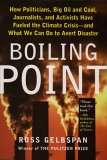Summary | Excerpt | Reviews | Beyond the Book | Readalikes | Genres & Themes | Author Bio
How Politicians, Big Oil and Coal, Journalists and Activists Are Fueling the Climate Crisis--and What We Can Do to Avert Disaster

Critics' Opinion:
Readers' Opinion:
First Published:
Jul 2004, 272 pages
Paperback:
Nov 2005, 304 pages
 Book Reviewed by:
Book Reviewed by:
BookBrowse Review Team
Buy This Book
In those areas in which it opposes such agreement--such as global climate change--it has fashioned a very different policy.
In the case of climate change, the Bush administration has set about to destroy the Kyoto process through a series of bilateral agreements with individual countries. In mid-2002, one month after withdrawing from the Kyoto process, Australia signed a bilateral agreement with the United States to cut emissions--an agreement that most observers believe will do nothing to avert climate chaos. As Dr. Frances Maguire of Greenpeace Australia pointed out: 'The agreement lacks any calls for direct action. It does not require any reduction in greenhouse gas emissions.'
Sunita Narain, director of the Centre for Science and Environment in New Delhi, summed up the administration's strategy in late 2003. 'The U.S. walked out of the Kyoto Protocol. It walked out of a multilateral agreement to limit luxury emissions, so that the poor would get ecological space, and the earth's climate system would recover. But the U.S. did not merely reject the protocol; it said it would work overtime to kill it off. The U.S. says it will prove its strategies for 'voluntary measures'--to switch to cleaner technologies--and 'bilateral agreements' will be more effective than a multilateral rule-bound agreement. Forget the rules now. What the U.S. is promising is that instead of the 5.2 per cent cut in emissions at 1990 levels, as the protocol requires, it will increase its emissions by over 30 per cent in the agreement period.
'The U.S. is certainly aggressive about its ideology. Its diplomatic cohorts go around the world wrapping up deals--on hydrogen technologies, carbon sequestration plans, or clean coal. Earlier this year, a U.S. climate delegation neatly stitched up the so-called hero of the developing world, India. It wowed our politicians and business leaders with a grandiose and futuristic hydrogen energy plan, in which hydrogen will be generated using fossil fuels (oil from Iraq?) as the source.'
In fact, U.S. delegations also met with representatives in Thailand, Malaysia, and Vietnam to pursue individual treaties and further undermine a coordinated international approach based on multilateral agreements.
A subsequent bilateral agreement with Italian president Silvio Berlusconi, Narain wrote, involves a joint program 'on so-called climate change mitigation strategies. Just two months before the next climate conference--which the Italians are hosting--the two have thumbed their noses at the multilateral world with public advertisements of this marriage.'
As the nations of the world gathered in Milan at the beginning of December 2003 for the ninth round of Kyoto talks, the Bush administration made its feelings very clear.
Kyoto is 'an unrealistic and ever-tightening regulatory straitjacket, curtailing energy consumption,' Paula Dobriansky, U.S. undersecretary of state for global affairs, wrote in the Financial Times newspaper. Added Conrad Lautenbacher, an undersecretary of commerce in the Bush administration, in a press conference in Milan: 'Where we are today in climate change science is problematic. We need more fundamental understanding.'
The Bush administration's desire to drive a stake through the heart of the Kyoto process may have been realized on December 2, 2003, when Russian president Vladimir Putin, after extensive conversations with the Bush administration, indicated strongly that Russia would most likely not ratify the protocol.
That announcement, coupled with the U.S. withdrawal, may have effectively killed the protocol--since its taking effect required its ratification by fifty-five countries that are responsible for 55 percent of the world's carbon emissions.
The new Bush posture was a radical departure from the Clinton administration, which, even in the absence of Senate ratification, had signed the Kyoto Protocol in 1999. It reached fruition in early 2003 when President Bush, in concert with some of the nation's leading emitters of carbon dioxide, announced a plan for companies to voluntarily reduce the 'greenhouse gas intensity' of their activities by 18 percent in the next ten years.
From Boiling Point by Ross Gelbspan, pages 93-126 of the hardcover edition. Reprinted with Permission from Basic Books – Copyright 2004.





The House on Biscayne Bay
by Chanel Cleeton
As death stalks a gothic mansion in Miami, the lives of two women intertwine as the past and present collide.

The Flower Sisters
by Michelle Collins Anderson
From the new Fannie Flagg of the Ozarks, a richly-woven story of family, forgiveness, and reinvention.

The Funeral Cryer by Wenyan Lu
Debut novelist Wenyan Lu brings us this witty yet profound story about one woman's midlife reawakening in contemporary rural China.
Your guide toexceptional books
BookBrowse seeks out and recommends the best in contemporary fiction and nonfiction—books that not only engage and entertain but also deepen our understanding of ourselves and the world around us.